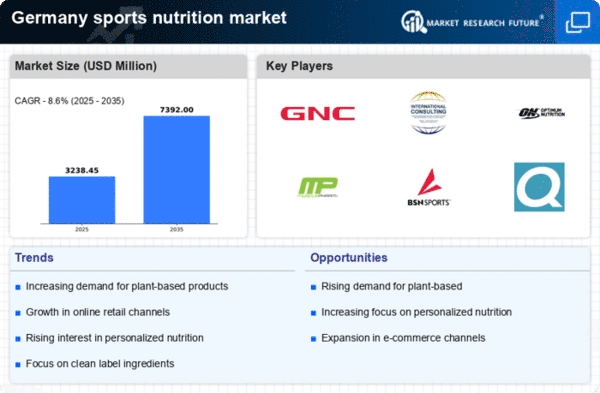Rise of Fitness Culture
The increasing popularity of fitness culture in Germany is a significant driver for the sports nutrition market. With more individuals engaging in regular physical activities, there is a corresponding rise in the demand for nutritional products that support these endeavors. Gyms, fitness studios, and outdoor activities are becoming integral parts of daily life for many Germans. This cultural shift is reflected in the growing sales of protein powders, meal replacements, and hydration products. In 2025, the sports nutrition market is anticipated to grow by approximately 8% annually, driven by this fitness-oriented lifestyle. As more people prioritize fitness, the demand for tailored nutrition solutions is likely to escalate, further fueling market growth.
Increasing Health Consciousness
The growing awareness of health and wellness among the German population is a pivotal driver for the sports nutrition market. As individuals become more informed about the benefits of proper nutrition, there is a noticeable shift towards products that support active lifestyles. This trend is reflected in the rising demand for protein supplements, energy bars, and recovery drinks. In 2025, the market is projected to reach approximately €1.5 billion, indicating a robust growth trajectory. Consumers are increasingly seeking products that not only enhance athletic performance but also contribute to overall health. This heightened focus on health consciousness is likely to propel the sports nutrition market further, as brands adapt their offerings to meet the evolving preferences of health-oriented consumers.
Expansion of E-commerce Platforms
The proliferation of e-commerce platforms in Germany is transforming the way consumers access sports nutrition products. Online shopping offers convenience and a wider selection, allowing consumers to explore various brands and formulations without geographical limitations. In 2025, e-commerce is expected to account for over 30% of total sales in the sports nutrition market. This shift is particularly appealing to younger demographics who prefer the ease of online purchasing. Additionally, the ability to read reviews and compare products enhances consumer confidence, further driving sales. As e-commerce continues to expand, it is likely to play a crucial role in shaping the competitive landscape of the sports nutrition market.
Influence of Social Media and Influencers
The impact of social media and fitness influencers on consumer behavior is a notable driver in the sports nutrition market. Platforms such as Instagram and YouTube have become vital channels for promoting sports nutrition products, with influencers showcasing their personal experiences and endorsements. This trend appears to resonate particularly well with younger audiences, who are more likely to trust recommendations from social media figures. In 2025, it is estimated that influencer marketing could account for up to 20% of sales in the sports nutrition market. As brands increasingly collaborate with influencers to reach target demographics, the role of social media in shaping consumer preferences is likely to intensify, driving further growth in the market.
Regulatory Support for Nutritional Products
The regulatory environment in Germany is evolving to support the sports nutrition market, which may enhance consumer trust and product quality. Recent initiatives by government bodies aim to establish clearer guidelines for labeling and health claims associated with nutritional products. This regulatory support is expected to foster innovation and encourage new entrants into the market. As consumers become more discerning, the assurance of compliance with safety and quality standards is likely to influence purchasing decisions. In 2025, the sports nutrition market could benefit from these regulatory advancements, as they may lead to increased consumer confidence and a broader acceptance of sports nutrition products across various demographics.


























Leave a Comment